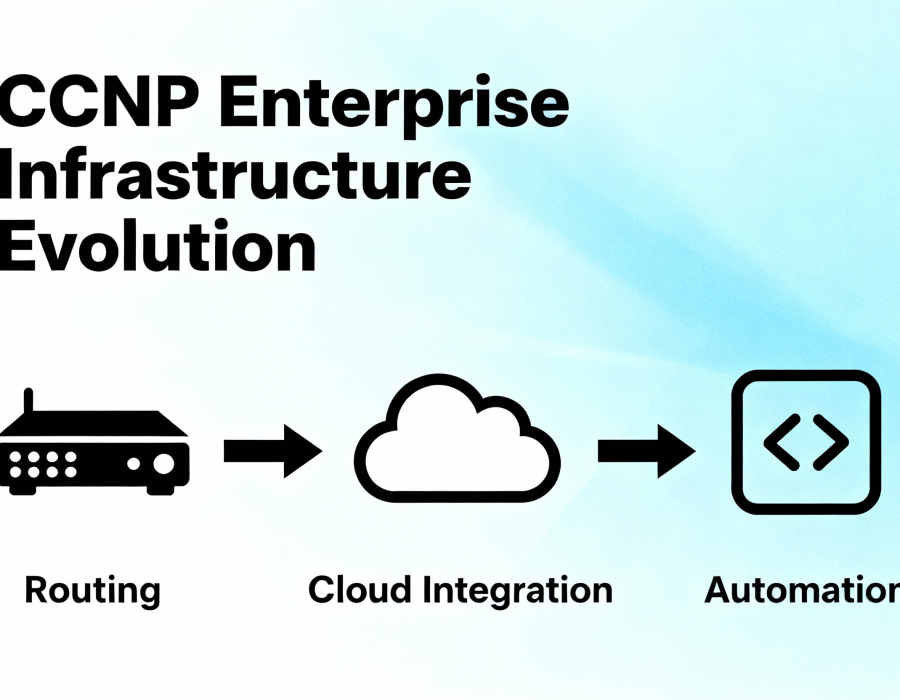In the ever-changing world of information technology, the way organizations manage and optimize their networks has undergone a dramatic transformation. From traditional routing and switching setups to modern, automated, and software-defined systems, the networking field continues to evolve at an unprecedented pace. At the center of this evolution stands CCNP Enterprise, one of Cisco’s most prestigious certifications that validates an individual’s ability to build and manage scalable enterprise networks.
Among the most valuable pathways for modern networking professionals is CCNP Enterprise infrastructure, which reflects Cisco’s forward-thinking approach to automation, programmability, and software-defined networking (SDN). Professionals who pursue this certification often advance toward CCNP Enterprise Infrastructure training, gaining the expertise to architect next-generation enterprise networks.
The Origins: Traditional Routing and Switching
The earlier versions of Cisco’s professional-level certifications, such as CCNP Routing and Switching, focused primarily on foundational network design and implementation. The emphasis was on traditional Layer 2 and Layer 3 concepts—covering routing protocols like OSPF, EIGRP, and BGP, along with VLANs, STP, and WAN technologies.
In the early days of networking, these skills were crucial. Enterprises relied heavily on physical devices and manual configurations to ensure connectivity. While effective, this approach required time-consuming management and often led to scalability challenges.
However, as organizations grew and the need for seamless data exchange increased, manual configurations became less efficient. The IT world needed something more dynamic—something that could handle increasing complexity and evolving business demands.
The Shift: Converged Networks and Virtualization
As technology advanced, enterprises began adopting virtualization, cloud computing, and converged network infrastructures. This shift led Cisco to reimagine its certification programs, moving beyond the basics of routing and switching.
The CCNP Enterprise certification was introduced to address these new challenges. It brought together not only the traditional concepts of networking but also new technologies that emphasize flexibility, scalability, and automation. Virtualization enabled network engineers to manage multiple systems with greater efficiency, while software-driven management tools reduced the reliance on manual configurations.
Modernization: The Rise of Automation and SDN
Today’s enterprise networks are no longer just about connecting devices—they are about connecting experiences. The evolution toward automation and SDN (Software-Defined Networking) has transformed how networks are designed, deployed, and maintained.
Cisco’s CCNP Enterprise infrastructure certification reflects this evolution. It focuses on technologies like Cisco DNA Center, SD-WAN, and intent-based networking—tools that allow engineers to automate tasks, monitor performance in real time, and implement policies consistently across global networks.
Automation plays a critical role in reducing human error, improving efficiency, and enhancing network security. With programmability using Python and APIs, engineers can now control network functions dynamically, aligning IT infrastructure with business goals faster than ever before.
How CCNP Enterprise Infrastructure Prepares You for the Future
Earning the CCNP Enterprise certification gives professionals a competitive advantage in a world where automation and cloud-based technologies are redefining networking. The certification’s curriculum ensures that candidates are well-versed in:
- Dual-stack (IPv4 and IPv6) architecture
- Virtualization and infrastructure automation
- Network assurance and security
- SD-WAN and policy-driven network management
Moreover, professionals who aim to master network design and optimization often continue their journey through CCNP Enterprise Infrastructure training, which represents the expert level of networking proficiency. This training delves deeper into complex automation, troubleshooting, and scalability concepts—skills that are invaluable for high-level network architects.
Why This Evolution Matters
The evolution of CCNP Enterprise Infrastructure mirrors the broader transformation in enterprise IT itself. Businesses are transitioning from static networks to intelligent, self-learning systems capable of adapting to real-time demands.
- Efficiency and Speed: Automated networks can detect issues and reconfigure themselves, reducing downtime and boosting productivity.
- Security and Resilience: With policy-driven management, networks are now more secure, adaptable, and responsive to threats.
- Scalability: Cloud-driven infrastructure and virtualization allow organizations to expand operations globally without adding significant complexity.
These advancements make CCNP Enterprise-certified professionals indispensable to modern businesses that depend on resilient and high-performance networks.
Career Opportunities in the Evolving Network Landscape
The skills gained through the CCNP Enterprise certification open the door to several lucrative career paths. Professionals can take on roles such as:
- Network Engineer
- Systems Administrator
- Network Automation Specialist
- Enterprise Architect
- Infrastructure Engineer
The evolution toward automation and programmability means employers are seeking professionals who can integrate network management with data analytics, cybersecurity, and cloud services.
Preparing for the Future with CCNP Enterprise
If you’re planning a long-term career in enterprise networking, CCNP Enterprise is an ideal certification to future-proof your skills. By combining foundational routing knowledge with cutting-edge automation practices, it ensures you stay ahead of the curve.
To build advanced expertise, many professionals pursue CCNP Enterprise Infrastructure training after completing their CCNP. This step offers a deeper understanding of network automation, controller-based architectures, and advanced troubleshooting techniques that are vital for managing global-scale networks.
In Conclusion
The CCNP Enterprise infrastructure certification represents more than just a milestone in a networking career—it symbolizes the evolution of enterprise technology itself. From manual routing configurations to fully automated network ecosystems, CCNP Enterprise has kept pace with the industry’s transformation.
As organizations continue embracing digital transformation, professionals with CCNP Enterprise certification will play a vital role in driving innovation and efficiency. Whether you’re looking to enhance your technical foundation or advance toward CCNP Enterprise Infrastructure, this certification is your gateway to the future of enterprise networking.





Comments